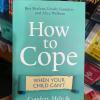Did you know that depression is growing at a constant rate? According to WHO, depression has increased by 18.4% within the last decade. Many people see depression as “taboo” or “just a way to get attention” but it is a lot more serious than most people think. The literal definition of depression is “feelings of severe despondency and dejection”. According to Audrey Willis, a writer in NCHPAD, most people who have any kind of depression usually don’t seek much needed help. In the novel “Ordinary People” by Judith Guest, Conrad, the main character, struggles with depression on the daily and the readers are by his side watching how it affects his relationships, personality, and view of himself. Big signs of depression that Conrad feels are: emptiness, guilt, worthlessness, irritation, trouble concentrating, less energetic, and less interest in previously loved activities. Depression should be taken seriously and here’s why.
First of all, lets address the elephant in the room. Suicide is obviously the most devastating consequence of depression. To really get my point through, here are some shocking but true facts about suicide that may make you take it seriously. According to AFSP, suicide is the 10th leading cause of death in the United States. In 2017, 47,173 Americans died by suicide. Also, in 2017, there were an estimated 1 million 4 hundred thousand suicide attempts. And think, all of this was only in America. And if you like looking at things in a more economical way, know that in 2015, suicide and self-harm cost the United States $69 billion. According to AFSP, white people aged between 45 and 54 years old have commit suicide the most between all races and ages. Also according to AFSP, Montana is the highest rated state in America when it comes to suicide. On average, one person commits suicide every 33 hours there. Annually, more than six times as many people die by suicide than murder in Montana. Suicide is the 2nd leading cause of death for people ages 15-44 there. In 2010, Montana spent a total of $253,380,000 on lifetime medical and work loss cost. Let all of that sink in. In “Ordinary People” Conrad goes as far as to attempt suicide and luckily fails.
Second of all, one thing that not everybody knows about depression is how it affects the body physically. First, depression affects the body’s central nervous system: According to Healthline, adults with depression struggle with memory loss and reaction time more than young adults with depression. Secondly, it affects the digestive system. People diagnosed with depression deal with weight gain, chance of type 2 diabetes, and eating disorders such as geriatric anorexia. Geriatric anorexia can cause stomachaches, cramps, constipation and malnutrition. Thirdly, depression can also affect cardiovascular and immune systems. Depression typically causes stress which increases the heart rate and makes blood vessels tighten, making your body feel a state of emergency and this happening can lead to heart diseases. If things like this keep happening to the cardiovascular system, it is possible to get other conditions such as: diabetes, high blood pressure, and high cholesterol. All of this is likely to lead to a heart attack. Fourth and finally, depression can lead to immune system problems. Depression and stress go hand and hand and according to Healthline, depression can make you more vulnerable to infections and diseases. A study says that there is an unknown connection between depression and inflammation. In “Ordinary People” the author doesn’t go as far as to have Conrad deal with any physical health problems because of his depression.
After reading this essay I hope that you have at least learned something about depression and it’s effects. Depression is a serious mental disorder that affects both the mind and body and it should be treated and taken seriously. Depression deserves to be treated seriously. Finally, if you or anyone you know of is struggling with depression, self-harm, or suicide, please call the National Suicide Prevention Lifeline at 800-273-8255 or contact the Crisis Text Line by texting “TALK” to 741741
Sources:
Bhandari, Smitha, “Signs and Symptoms of Clinical Depression.” WebMD, WebMD, April 22nd 2018, www.webmd.com/depression/guide/depression-symptoms-causes
“Suicide Statistics.” AFSP, afsp.org/about-suicide/suicide-statistics
Pietrangelo, Ann, “The Effects of Depression in Your Body.”, Healthline, September 11 2017,
www.healthline.com/health/depression/effects-on-body#9
















